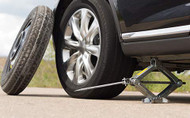Spare Tire Economics - Cheaper Without One?
Posted by Agota Szabo on May 3rd 2022
Is the spare tire becoming a thing of the past? The sad truth is that more and more automakers are getting rid of this important piece of equipment. But why is that?
The Ford C-Max and the Chevy Cruze Eco: these two vehicles are just a few models which now come without an original equipment spare tire. Yep, no "doughnut."
You know, that thing that can be a life and time saver. In the event that you end up with a flat while you're on the go, there is no spare tire to rescue you. In fact, more and more automakers are following suit when it comes to ditching the doughnut tire.

A lot of this supposedly has to do with reaching the 54.5 miles per gallon fuel economy standard by 2025. Being that spare tires can weigh up to 50 pounds, the stated reasoning is that removing this excess weight can help improve fuel economy.
In fact, according to a November 2015 AAA report, about one-third of all new cars sold today don't come with spare tires. Instead, they come with an inflator kit or are equipped with run-flat tires, which are able to travel up to 50 miles without any air.
But is ditching the spare tire really more economical? Is this a reason that makes sense?
Making the Case for No Spare Tire
Having a spare tire is kind of like buying insurance - have one to give you peace of mind in case one of your tires goes flat. Some people drive all of their lives and never have to change a tire in transit. Others may blow several out a year.
These days, most cars weigh between 3,000 and 4,000 pounds. According to GasBuddy, a vehicle weight reduction of 10% would save up to 7% in fuel economy. A reduction of 50 pounds should result in an increase in efficiency of about 1% depending on the curb weight of your vehicle. For someone who spends $2,000/year on fuel, this would mean that you are saving approx. $20/year by getting rid of spare tires.
So, the savings on gas from removing a spare tire are close to negligible. Again, we ask the question, why no spare?
While you might be saving a bit of money on gas, the manufacturers are saving on costs big time. The cost of a spare tire, tools, and jack is likely in the $100/car range for large manufacturers. For a company that sells millions of cars, this is going to mean huge savings over a long period of time.
Making the Case for the Spare Tire
There are several reasons why it still makes sense to purchase a car with or ensure your car has a spare tire.
- The inflator kits are ineffective in the case of blowouts. They are only sufficient in case of punctures on the middle tread area (i.e. running over a nail). So, in the event that you experience a blowout and you only have an inflator kit, you're likely to be towed. That's hardly convenient and can quickly undo any fuel savings you experienced from driving without a spare.
- Depending on your vehicle type, the fuel economy benefits experienced are likely to be very minimal. Is sacrificing your spare really worth it?
- Run-Flat tires, the other major alternative to the spare tire, are considerably more expensive than conventional tires. What's more, they can rarely be repaired in the event of damage. Self-sealing tires, a similar type of technology, aren't yet widely available and are also considerably more expensive.

When it comes to deciding whether or not to ditch the spare, the decision is yours to make. However, it's worth noting that some automakers who years ago removed spare tires from models are re-introducing it for subsequent models. While the decision is yours, often your least expensive option when it comes to spare tires, is to pick up a cheap tire to be the spare. You can do so for a lesser price while keeping peace of mind.
List of Vehicles That Don't Come with Spare Tires
Here is a list of popular manufacturers that have either decided to stop offering a spare tire or have decided to make this an optional feature. Manufacturers such as Audi, BMW, and Porsche have eliminated the spare tire from nearly all of their models. Others have left this as an optional feature. See the full list from AAA here.
















